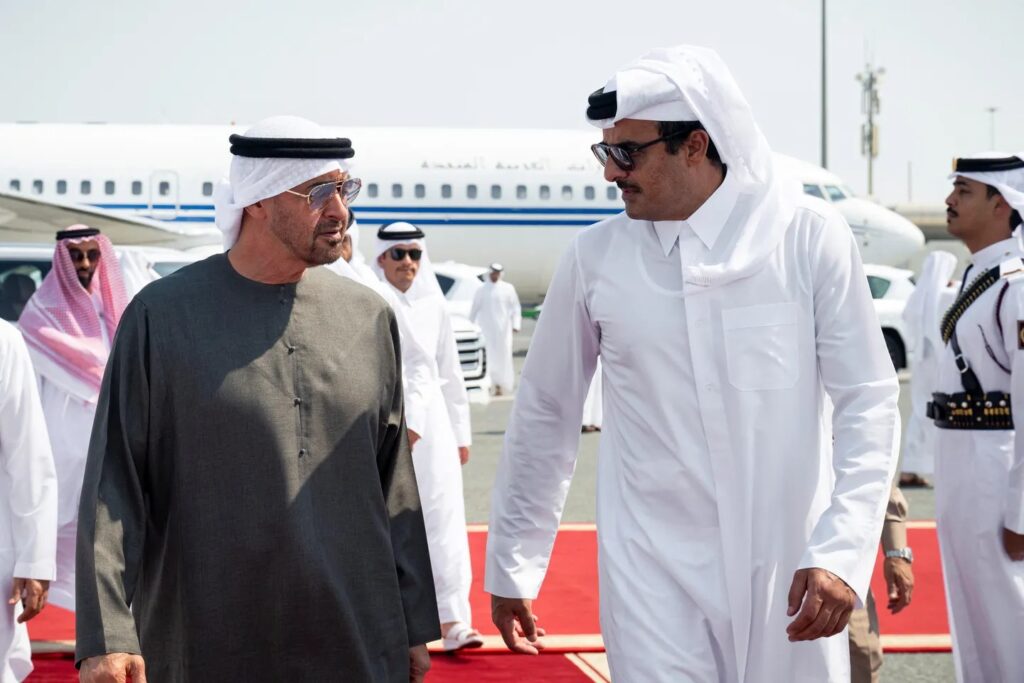The United Arab Emirates has stepped up its Gulf diplomacy following Israel’s recent attack on Hamas leaders in Doha. President Sheikh Mohammed bin Zayed Al Nahyan embarked on a tour of Gulf countries to coordinate regional positions and reinforce unity, a senior diplomatic adviser said.
Anwar Gargash, the UAE’s diplomatic adviser, described the tour as a reflection of “a deep conviction in strengthening coordination and cooperation, and in reinforcing the concept of a common destiny.” The visit underscores the UAE’s commitment to collective security and strategic alignment among Gulf nations.
The Israeli airstrike on Hamas political leaders in Qatar’s capital on Tuesday escalated tensions in the Middle East and drew widespread international condemnation. Sheikh Mohammed was the first head of state to visit Doha following the attack, signaling the UAE’s diplomatic support for Qatar. He subsequently traveled to Bahrain and Oman as part of his regional engagement.
Doha is set to host an emergency Arab-Islamic summit next Sunday and Monday to address the incident, according to Qatar’s state news agency. The summit is expected to bring together leaders from across the Arab and Islamic world to discuss the attack, its regional implications, and measures to strengthen collective security.
In a separate statement, the UAE Ministry of Foreign Affairs condemned Israeli Prime Minister Benjamin Netanyahu’s recent remarks against Qatar. The ministry emphasized that any aggression toward a Gulf state constitutes an attack on the “collective Gulf security framework,” highlighting the UAE’s role in maintaining regional stability.
Netanyahu had warned Qatar on Wednesday to expel Hamas officials or “bring them to justice,” asserting that failure to act would prompt Israeli retaliation. He accused Qatar of providing a safe haven and financial support to Hamas, drawing strong criticism from Doha and other Gulf nations.
The UAE’s response reflects its broader strategy of balancing regional diplomacy, economic interests, and security commitments. As a major oil producer and regional trade hub, the UAE has significant diplomatic influence across the Middle East. Its engagement in Gulf diplomacy demonstrates a proactive approach to conflict management, regional cooperation, and strategic security.
Since signing the Abraham Accords with Israel in 2020, the UAE has maintained close economic, security, and defense ties with Tel Aviv. The normalization agreement, brokered by the United States, opened avenues for trade, investment, and collaborative security measures, while allowing the UAE to maintain its role as a mediator and stabilizing force in the region.
The current Gulf tour also highlights the UAE’s commitment to diplomatic coordination among Gulf Cooperation Council (GCC) members. By visiting Doha, Bahrain, and Oman, Sheikh Mohammed aims to ensure that Gulf states speak with a unified voice in addressing external threats and regional crises. Observers note that the tour reinforces the UAE’s leadership role in promoting security and stability in the Gulf.
The diplomatic outreach comes amid rising regional tensions following the Israeli airstrike, with experts warning that unchecked escalation could destabilize the Middle East. By emphasizing dialogue, coordination, and collective security, the UAE aims to mitigate risks and maintain the balance of power in the region.
UAE Gulf diplomacy continues to focus on building trust, reinforcing alliances, and ensuring that collective security frameworks remain robust. As regional leaders prepare for the upcoming emergency summit in Doha, the UAE’s strategic efforts signal its determination to protect Gulf interests, safeguard Qatar, and promote stability throughout the Middle East.



